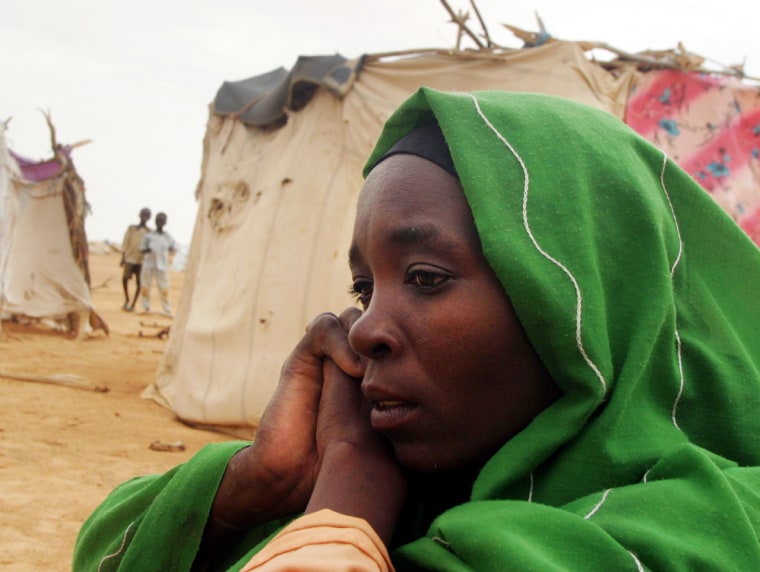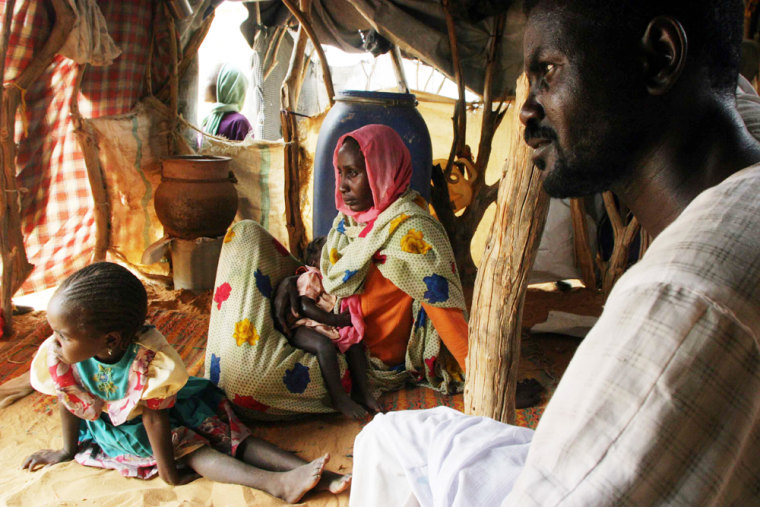As she had done every morning for a week, Mecka Ibrahim brought the lips of her howling infant to her breast, hoping the milk would flow again. She shifted the 1-year-old boy's frail little body and adjusted her position, folding and unfolding her legs. She tried again, with lithe arms cradling the boy, Issa. He was hungry and reached for her, but her breast was still dry.
She recognized what health workers had told her, that stress and malnutrition were blocking her ability to produce milk. "I am too sad," Ibrahim said as she rocked the baby, shielding his eyes from a swirling sandstorm approaching Oure Cassoni, a refugee camp on the border with Sudan.
Ibrahim came to this labyrinth of sand-covered tents after her village in the Darfur region of Sudan was attacked 16 months ago and her husband was killed. Five months pregnant, she fled across the desert to Chad. She found herself in the company of women, who make up 90 percent of the adult population of the refugee camp and carry the burdens of a conflict that has displaced 1.5 million people and killed as many as 50,000.
Other new mothers at the camp have discovered, like Ibrahim, that they can no longer produce breast milk for their babies. The condition is caused not only by trauma but also by dehydration and malnourishment. Ibrahim said she often feels too weak to wait in line for her rations: heavy bags of cornmeal, peas and salt.
"All night, I'm awake thinking of what happened in my village," she said. "I want to be stronger. I keep trying. But I am tired."
Ibrahim is a member of the African Zaghawa tribe, whose members, along with those of the Fur and Masalit tribes, were driven off their land in Darfur by Arab militias backed by government forces that are fighting two rebel groups. Many African men and boys of fighting age were killed. Some escaped and became fighters for the rebel movements. Others simply left looking for work.
Even during peaceful times in Africa, women are responsible for most of the work on a continent where female muscle rather than the modern machine is the force behind survival. Fetching buckets of water and hauling bundles of firewood, cooking and cleaning, farming and planting are among a long list of tasks that men shrug off as women's work.
But women from Darfur bear an even heavier load. Children and the elderly depend entirely on the health and strength of the women. More and more cases of lost breast milk, aggravated by trauma and illness from rapes, have been reported in the last few months, and doctors warn about the additional calamity.
"This is very dangerous. And it's extremely important to note because the burden will now be greater on the already stressed feeding centers," said Jennifer Leaning, a professor of public health at Harvard University. Leaning toured Chad's camps in June as a board member of Physicians for Human Rights, a Boston-based organization.
"Normally, you can count on breast milk to be 100 percent complete food," Leaning said. "This is a situation where anxiety and stress is far greater for women, and it adds a particular layer of stress to an already stressed population and stressed humanitarian operation. If breast-feeding is blunted, small infants risk malnourishment and even death."
Ibrahim's baby, Issa, is now at the camp feeding center with many other malnourished children. Only one doctor serves the camp of 17,000. Ibrahim prays her son will live and gain the weight he seems to keep losing.
Four out of 10 Sudanese refugee children younger than 5 in Chadian camps are acutely malnourished, according to a survey by the U.S. Centers for Disease Control and Prevention.
The survey said that the mortality rate for children "is above the emergency threshold" and that there is a "very high risk for serious illness and death." Representatives of the U.N. High Commissioner for Refugees, the agency that is running the camp, said they were aware of the problems and were scrambling to bring in more aid.
But relief has been slow to reach one of the world's most remote and impoverished regions. Recently, fierce rains filled seasonal riverbeds, or wadis, with dirty brown water, creating miles of fast-moving rivers. The water slowly evaporates under the scorching sun, leaving quicksand-like mud in the gullies that is nearly impossible to pass even with four-wheel-drive vehicles.
Recently, aid trucks were backed up and unable to cross the wadis for two days. Violent sandstorms that erupt in the evening and churn the air into a suffocating blend of sand and wind also kept the trucks away.
Meanwhile, the women suffer, hungry children clasping their hands. There has been no study of the number of women in the camps who have lost breast milk to trauma. But nurses at the Oure Cassoni camp said 262 women have registered with the hospital, reporting they were losing the ability to breast-feed or had no milk. Last week, the nurses said, nine children died of malnourishment caused by a lack of milk.
"Women -- some who have been raped, some who have lost husbands -- are totally humiliated by the time they arrive here," said Asma Haroon, a protection officer working in Chad for the International Rescue Committee. "But that's just the start of the story. Women are the only ones left to turn to. The men are either missing or dead or fighting. They are carrying Africa's burden's on their backs in ways that are more than physical now. It's very worrisome."
Quiet suffering
Zahara Abdul Karim, 28, came to the camp alone. She said she was raped by two attackers from the Arab militia known as Janjaweed in her village, Ablieh, near North Darfur's town of Kitum. She was seven months pregnant. She said her two sons, ages 8 and 6, were killed in front of her.
She spoke softly, her eyes always lowered. She worried that after the rape, her community would not accept her.

She showed the scar of a thick slash that she said one of her attackers left on her leg, a sign that is also used to brand cows. She asked if there was anyone who could remove it. She bashfully moved her flowing, torn dress over her legs, waved her hands and then said she had other, more pressing concerns.
Her breast milk comes and goes when she has to feed her new child, the only family member she has left. And she's now caring for three orphans who stopped by one day, flashing big smiles. She made them a ball out of string, and suddenly the children began sleeping and taking meals in her tent. At first, she didn't want them too close. But now she feels like their mother, even though she doesn't have enough food.
"I will just have to make do," she said, as she stirred a pot of thick porridge, then stared blankly at her small ration of corn. "I can't refuse them."
In the cramped, hot tent that serves as the hospital, even some of the nurses hired to care for others are suffering quietly on their own.
Halima Ahmed Omar, a nurse at the feeding center, said she's been having trouble breast-feeding. Recently, she lost all her milk, but has been making an effort to reduce her stress.
Her mother, Omnasour Haraba, 58, admitted that she is making her daughter more nervous with worry. Haraba, who has a worn face and watery eyes, waved her walking stick and called out that her family will end up on the margins of even the most desperate in this camp. Her daughter held her hand and lifted a bowl of murky water to her dry lips, trying to soothe her shattered nerves.
"We were very scared, very scared. Bad things happened during the war, and now we have this ill life," Haraba said, wrapping her orange scarf around her head, pounding her chest with her right hand and then curling into a ball as she sat under the shade of her tent. Her other daughter, Raida Baheredin, 20, came to comfort her and reassure her that they all would not die.
Searching for calm
In another section of the camp, Malka Silek Mohamed, 28, said she had lost her milk. Like so many women here, she no longer has a backup plan: Her goat was stolen during fighting in her village.
In rural Africa, when women are too tired to breast-feed, they turn to their animals. In most villages, there is no baby formula. When the animals are gone, it's as if money suddenly has been emptied from a savings account.
"There is no milk, and this is a major problem for the ladies of the camp," said Hadija Adam, 47, a mother of nine who had gathered a group of women to talk about their problems.
"It's bad here because some ladies can't feed their children," said Mazaher Hager, 20, who rushed to join the group of women dressed in flowing, colorful head scarves, forming a rainbow of oranges, reds and blues. Their clothing, though, did not fit their mood. Some women in the group shouted out other complaints, saying they needed more water, more food, more help.
"We are weak from our journeys here," declared Hager, who said she was raped in April when her village was attacked and was now feeling ill with headaches and vaginal pain. "I can't do the carrying I used to. It hurts to even carry water."
Adam hushed the crowd. The women needed to form a committee, she resolved. "Act like the men," she said, waving her arms and trying to appoint a leadership.
She has always been this way, she explained later. "A fighter," she said, shaking the thick sand off her clothing.
"When the Janjaweed came, I told the ladies to refuse sex. I took some rocks and threw them at the Janjaweed faces when they came to get me at the well." One man shot her in the right leg, she said, and she was raped, with a gun to her head.
Ibrahim heard about the get-together organized by Adam. A friend in the neighboring tent even asked her to attend, tugging at her hand.
But Ibrahim was staying home, trying to eat a bowl of cornmeal and sipping water. She knew she had to relax for her breast milk to return, so she had asked another neighbor to come over to braid her hair. The idea was to find a distraction and think of something else.
"With my husband gone, I've been feeling constant sadness. I am sad all the night and all the day. But I want to nurse Issa again," Ibrahim said, holding the baby on her lap as he sucked at his hand. She looked down at him, smoothed his curly patch of hair and said, "I don't want to feel useless."
